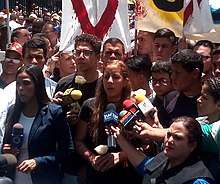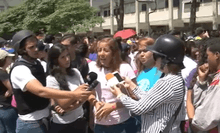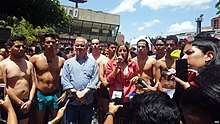Rafaela Requesens
| Rafaela Requesens | |
|---|---|
 Requesens (center) at the March of Silence in 2017 | |
| Born |
Rafaela María Requesens Martínez June 12, 1992 Caracas, Venezuela |
| Alma mater | Central University of Venezuela |
| Family | Juan Requesens (brother) |
Rafaela Requesens (born June 12, 1992)[1] is the current President of the Federation of the Student Centers of the Central University of Venezuela (FCU-UCV), an organiser of student protests in Venezuela, and an activist in the country. She was a prominent figure of the 2017 Venezuelan protests, along with her brother, Juan Requesens.
Early life
Requesens attended high school at the Los Riscos school.[2] She was a flamenco dancer for fifteen years from the age of six, and wanted to pursue this as a career before facing injury due to being overweight, ultimately resulting in knee surgery after a rigorous exercise program.[2] While she was still dancing, her brother convinced her to go to university, and she chose to study Political Studies at the Central University of Venezuela (UCV), starting in 2010. It was after her injury, which occurred during a year out, that she became interested in politics.[2] She said in a 2017 interview that going to UCV was "the best thing that had happened to [her]".[1]
After three years at university, she took a year off to study at the Culinary Institute of Caracas, but quickly returned to classes at UCV, saying this was because it is where her passions lay.[1][2]
Requesens had five tattoos in 2017, getting her first tattoo aged 17, and has a lip piercing. When criticised for these, she has reminded people that there are politicians who are visibly tattooed, like Miguel Pizarro in Venezuela. Her favorite baseball team is Caribes de Anzoátegui.[1]
She also took part in the 2014 Venezuelan protests with her brother, though was not a notable figure.[3] In retrospect, she has said that during these protests she was "itching" to go out and experience it, fearlessly throwing things without really acknowledging the reality of the situation. She also said that she believes her student movement is a generation below her brother's, and that they have some criticisms of the 2014 protests.[2]
Student politics and movements
Requesens became the president of the Federation of Students of Central University on February 17, 2017, with her platform Creo en la U[niversidad] ("I believe in the U[niversity]"), and was very quickly active in protests and politics. She became only the second female student to hold the position.[4] The elections were contentious, but externally. A few days earlier, on February 14, the Venezuelan courts had ordered the suspension of university-wide elections; the UCV votes went ahead "hoping to send a message" to the government.[4] Additionally, detractors were throwing tear gas canisters during the voting, ultimately entering one building with tear gas bombs and gasoline before burning the place.[4] In 2017, UCV had 31,762 students in 11 faculties and 44 schools.[5]
Her first protests as student leader came a month and a half after her election and were staged against the dismissal of Supreme Court judges and corruption in regional elections.[3] One article states that she "went from organizing recreational activities, such as football caimaneras, to leading a generation". This article gave her the epithet "tirapiedras", meaning "stone-thrower", invoking the nickname to highlight her grassroots progression.[2]
During the protests in 2017, she became more committed to activism, being thrust in with her student position, saying she had previously been "carried away by sentimentality and ideals" but in early 2017 saw young people murdered. As a comparison, she added that "in 2018, Venezuela [was] much calmer", which was "frustrating", but allowed her to "get up, go to college" whilst working on political issues.[6]
On May 26, 2017, Requesens spoke at a memorial mass for students killed during the protests, held at the Aula Magna.[2] Later in the day she spoke about regret and pressure as a leader, using language evocative of war, saying that "[y]ou have to take these measures, knowing that there are going to be risks, but that it can be positive for the people who will come after. It is difficult to see, that you summon your comrades and they end up injured by the repression of the state. It's so lousy, because you told them what was to be done and they go because they are 'ride-or-die' and want to fight for their country. But it's your responsibility and it hurts."[2]
Requesens named her brother, a former president of the student foundation, as one of her political inspirations.[7] Still, she has said that he was not her main reason for entering politics.[2]
Representing the students of UCV, Requesens has taken some strong stances, including on national and international scales. In May 2018, during the process of the presidential election, she announced that the University would be among the bodies that did not officially recognise the election or its results as legitimate. In one statement shortly before the election, she explained that "there isn't the conditions that would allow you to go through the process [of challenging the election] because we are facing a dictatorship".[5]
2017 protests


In June 2017, the Australian Broadcasting Corporation referred to Requesens as "the face of Venezuela's youth uprising".[8] This look into the protests notes the violence of the Bolivarian National Guard against students, and how Requesens used her words more than violence, which earned her "thousands of followers" and, from this, she "found herself leading".[8] The reasons for the protests were varied, from the poverty in the nation to the proposed constitutional rewrite by Nicolás Maduro, as well as the announcement of the Constituent National Assembly. Requesens led a protest specifically against these latter issues, saying that the government should change instead of the Constitution.[9] Even into July 2017, Requesens continued to state that the government "would not manage to intimidate students" – at this time, the armed forces were directly fighting back in universities.[10]
Requesens was outspoken during various protests. During the first week of May 2017, when dozens of protesters were killed, the UCV students planned a march to the Ministry of Internal Affairs to protest these people being "murdered". When the National Guard barricaded the campus in full attack gear, throwing tear gas when students tried to escape, Requesens announced that they were being treated "like criminals [...] for no reason". The students then held a rally outside the FCU in the middle of the campus; journalists interviewing her wore the protective gear usually seen on those in war zones.[11] It was in this week that Requesens' direct counterpart, the president of the FCU at José Antonio Anzoátegui Territorial University, was shot dead in his campus office.[11]
On June 2, Venezuelan state television began recording an opposition student protest, speaking with Requesens and so making her the first opposition leader to be featured on a state broadcast in a long time. In the broadcast, she was seen to debate with the Minister of Communication, Ernesto Villegas.[3]
She was also interviewed by Voice of America about a protest towards the end of June 2017, called Trancazo Nacional (National Roadblock), organised by the Democratic Unity Roundtable.[12][13] Several trancazos took place at this time, including some organised by students. The trancazos grew and involved many regular citizens, not only in Caracas, but also across the country. Requesens called it a "positive example" of the change she was trying to bring to the country, because it engaged many different people in peaceful rebellion, and celebrated that during a student trancazo, Caracas and other cities had effectively been shut down for up to four hours, from a combined effort of walkouts and roadblocks.[13][14] More trancazos resumed in early July 2017, after other protests in which 25 students were detained for four days for protesting.[15][16] These progressively lengthened in duration, though protests at this time also shifted focus to community outreach, Requesens stating that they would continue to protest and work towards campaigning against the Maduro government in the July 16 referendum rejecting the Constituent National Assembly.[15][17]
On July 7, Requesens with other UCV students further stated their support for this anti-government force, with an announcement from the National Assembly and opposition parties, as well as Requesens herself, that the students of UCV were helping to organise the public referendum that would aim to challenge the new Constituent National Assembly.[18] She explained:
We are joining the Liberation Movement, which will be headed up by the different social sectors in the country. As students, we will play a fundamental role from here until July 16. We will act as mobilizers and promoters, we will carry the message as an organised group of local people and in the streets of the whole country.
— Rafaela Requesens, Voz de América
Requesens described her protest leadership philosophy in an interview, saying "[y]ou have a responsibility for the image they see of you. You're not going to throw anything out there. You can give support to all and, for those in front, make them feel that you're with them, that you aren't leaving them alone".[2]
Arrest and political activism

Requesens' movement into the wider politics of Venezuela came in August 2018, after the Caracas drone attack that saw her arrested alongside her brother, in what was referred to as an "arbitrary" move to suppress political opposition. She was released shortly afterwards.[19] She was featured in Bloomberg's "Week in Pictures" on August 9, 2018 due to the global status her position had suddenly achieved.[20] Though not a deputy herself, Requesens is associated with the Justice First party to which her brother belongs. After the arrest, the party released an urgent statement that denounced the arrest of both Juan and Rafaela as a "kidnapping".[21]
It was after this event that Rafaela took another leadership role in the protests, demanding the release of her brother as well as the return of democracy and an improved nation. In the days following her release, Requesens spoke several times in the National Assembly and to media about the issues in Venezuela.[22][23] She also said that she and her brother had been targeted because "the government is scared of young people".[24] With protests arising in the nation, Requesens took a leadership role to organise such efforts, asking Venezuela to unite.[25] In some of these protests, such as the underwear demonstration in Plaza Brión, Requesens helped lead students and faculty from UCV alike.[26]
See also
References
- 1 2 3 4 "Rafaela Requesens: De bailarina de flamenco a presidenta de la FCU UCV". contrapunto.com (in Spanish). Retrieved September 2, 2018.
- 1 2 3 4 5 6 7 8 9 10 "Rafaela Requesens, tirapiedras convertida en líder". Clímax/El Estímulo (in Spanish). August 8, 2018. Retrieved September 3, 2018.
- 1 2 3 Poderopedia, Equipo. "Rafaela Requesens". Poderopedia (in Spanish). Retrieved September 2, 2018.
- 1 2 3 "Rafaela Requesens ganó elecciones en la UCV, entre nubes de gas lacrimógeno" [Rafaela Requesens wins UCV election, among clouds of tear gas]. Efecto Cocuyo (in Spanish). Retrieved August 18, 2018.
- 1 2 Kolster, Nicole. "Venezuela a cinco días de las elecciones ¿Votar o abstenerse?". Voz de América (in Spanish). Retrieved September 2, 2018.
- ↑ "Life in Venezuela, One Year After the Protests". Bloomberg L.P. Retrieved August 18, 2018.
- ↑ "Candidatos a la FCU de la UCV buscan revivir el sentimiento universitario" [FCU candidates at UCV want to revive the university spirit]. Efecto Cocuyo (in Spanish). Retrieved August 19, 2018.
- 1 2 "'Of course I'm afraid': Meet the face of Venezuela's youth uprising". ABC Triple J. Retrieved August 18, 2018.
- ↑ "Venezuela Protests: Students take the lead". Al Día News. Retrieved August 19, 2018.
- ↑ "Several People Injured in Clashes With Police in Venezuela". Sputnik News. Retrieved August 19, 2018.
- 1 2 "Suben a 36 los muertos por protestas en Venezuela". Voz de América (in Spanish). Retrieved September 2, 2018.
- ↑ "GNB y presuntos colectivos reprimieron "el trancazo" en La Urbina". El Nacional (in Spanish). Retrieved September 3, 2018.
- 1 2 ""Trancazo" paraliza Caracas y otras ciudades". Voz de América (in Spanish). Retrieved September 2, 2018.
- ↑ "MUD convoca doble 'trancazo' para lunes y martes de esta semana". Efecto Cocuyo (in Spanish). Retrieved September 3, 2018.
- 1 2 Algarra, Álvaro. "Venezuela: Estudiantes se sumarán a marchas este 5 de julio". Voz de América (in Spanish). Retrieved September 2, 2018.
- ↑ "La oposición venezolana exige la liberación de estudiantes detenidos en protesta". EFE (in Spanish). Retrieved September 3, 2018.
- ↑ "Oposición convoca al "Trancazo contra la dictadura" este martes 4 de julio". El Nacional (in Spanish). Retrieved September 3, 2018.
- ↑ "Maduro presiona a empleados públicos a votar por constituyente". Voz de América (in Spanish). Retrieved September 2, 2018.
- ↑ "Venezuela lawmaker, student leader arrested: opposition". Reuters. Retrieved August 19, 2018.
- ↑ "Bloomberg's Week in Pictures August 9, 2018". Bloomberg L.P. Retrieved August 19, 2018.
- ↑ "Denunciaron que el Sebin secuestró a Rafaela Requesens". El Nacional (in Spanish). Retrieved September 2, 2018.
- ↑ "La hermana de Juan Requesens, opositor venezolano, condena la detención de su familiar" [Juan Requesens' sister, of the Venezuelan opposition, condemns the detention of her brother]. CNN en Español (in Spanish). Retrieved August 19, 2018.
- ↑ "Condenan desaparición forzada de Juan Requesens". El Nacional (in Spanish). Retrieved August 24, 2018.
- ↑ "Rafaela Requesens: El Gobierno le tiene miedo a la juventud venezolana" [Rafaela Requesens: The government is afraid of Venezuela's young]. Noticiero Venevision (in Spanish). Retrieved August 19, 2018.
- ↑ "Rafaela Requesens: "Incluso estando desnudos, los venezolanos seguimos"". El Nacional (in Spanish). Retrieved August 24, 2018.
- ↑ "Venezolanos salen a a las calles para exigir liberación de Requesens". Voice of America (in Spanish). Retrieved September 2, 2018.
External links
- Soto, Noris (August 4, 2018). "Life in Venezuela, One Year After the Protests". Bloomberg L.P. Retrieved August 18, 2018.
- Marchese, David (June 23, 2017). "'Of course I'm afraid': Meet the face of Venezuela's youth uprising". Australian Broadcasting Corporation. Retrieved August 18, 2018.
- (in Spanish) Reyes, Ivan (February 13, 2017). "Candidatos a la FCU de la UCV buscan revivir el sentimiento universitario". Efecto Cocuyo. Retrieved June 10, 2017.
- (in Spanish) Reyes, Ivan (February 18, 2017). "Rafaela Requesens ganó elecciones en la UCV, entre nubes de gas lacrimógeno". Efecto Cocuyo. Retrieved June 10, 2017.
- (in Spanish) "Hermana de Juan Requesens fue liberada tras secuestro en Táchira Roxana Peña". Panorama. June 12, 2015. Retrieved June 10, 2017.
- (in Spanish) "Hermana y amigo del diputado electo Juan Requesens fueron secuestrados". El Universal. December 18, 2015. Retrieved June 10, 2017.